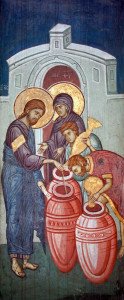 These next couple of posts will reflect on Eschatology. Eschatology is a chewy subject, difficult to translate into meaningful expression; however, I have found John P. Manoussakis in God After Metaphysics: A Theological Aesthetic” offers some great insight.
These next couple of posts will reflect on Eschatology. Eschatology is a chewy subject, difficult to translate into meaningful expression; however, I have found John P. Manoussakis in God After Metaphysics: A Theological Aesthetic” offers some great insight.
This second Sunday after the Epiphany we will hear from John’s Gospel and the wedding feast at Cana. “My hour has not yet come” (John 2:4), says Jesus when his mother informs him of the depleted wine.
Manoussakis points out that we think in time, chronologically, does cause not precede effect? He answers:
Not necessarily: The chronological and ontological primacy of the cause is challenged by a series of events, such as the creation, the Incarnation, the crucifixion and the resurrection… Does the cross make any sense at all if seen by itself, that is, as the effect of what has preceded it in the life of Jesus? We would argue that the cross becomes the cross only once it is seen from the future, that is, from the point of view of the resurrection that follows it. Theologically, then, it is the resurrection that is the ‘cause’ of the crucifixion.
Jesus’ resurrection only makes sense in light of the final resurrection of all. Theologically speaking, then, the cause of the things that happen and have happened lies not in their beginning but ‘in the end’—for they do come from the kingdom of God, for it is the kingdom that is, properly speaking, their origin.
Eschatology, therefore, reverses the naturalistic, essentialist, and historicist models by making the seemingly improbable claim that I am not who I am, or even less, who I was and have been, but rather, like the theophanic Name of Exodus (3:14): “I am who I will be.” (Pages 60-61 Manoussakis)
Jesus, sharing both a human and divine nature, and human and divine will is conscious of, living in, “dancing” in, both worlds, the now and the not yet, the unfulfilled and in the fully realized, what we call the Eschatological reality to be shared at the end times. This is our purpose, our telos: to share in God’s life, forever.
In his first sign at Cana, Jesus is signifying in the new wine, the future age, the fullness of a restored life in communion with God, the realization of human life in all its fullness which in Jesus already is. God sees time as a painting, all at once, says Augustine, yet we are trapped in time and the unnatural state of death. The lure of the future is drawing us into the fullness of the eschatological reality we were created to be, feasting at the banquet, the wedding of earth and heaven and all creation in communion with God. We are who we will be. The future is creating the present if we yield to the call of true life.
Jesus’ hour and our hour is one, for where Jesus is there am I: “The hour has come for the Son of Man to be glorified. Very truly, I tell you, unless a grain of wheat falls into the earth and dies, it remains just a single grain; but if it dies, it bears much fruit. Those who love their life lose it, and those who hate their life in this world will keep it for eternal life. Whoever serves me must follow me, and where I am, there will my servant be also.” (John 12:23-26)

By Sarah Isabel Laviolette January 13, 2016 - 6:39 pm
An excellent read.
By Gregor Sneddon January 13, 2016 - 7:54 pm
Thanks Sarah!
By Charles Alexander Hunter January 14, 2016 - 5:39 pm
Losing touch with Anglican Church.